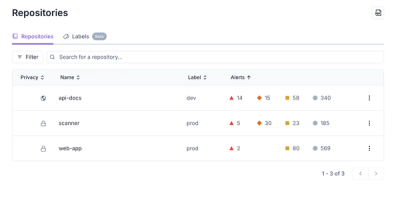
Product
Redesigned Repositories Page: A Faster Way to Prioritize Security Risk
Our redesigned Repositories page adds alert severity, filtering, and tabs for faster triage and clearer insights across all your projects.
A Python package for Substrait, the cross-language specification for data compute operations.
You can install the Python substrait bindings from PyPI or conda-forge
pip install substrait
conda install -c conda-forge python-substrait # or use mamba
This project aims to provide a Python interface for the Substrait specification. It will allow users to construct and manipulate a Substrait Plan from Python for evaluation by a Substrait consumer, such as DataFusion or DuckDB.
This project is not an execution engine for Substrait Plans.
This is an experimental package that is still under development.
The substrait.proto module provides access to the classes
that represent a substrait Plan, thus allowing to create new plans.
Here is an example plan equivalent to SELECT first_name FROM person
where people table has first_name and surname columns of type String
>>> from substrait import proto
>>> plan = proto.Plan(
... relations=[
... proto.PlanRel(
... root=proto.RelRoot(
... names=["first_name"],
... input=proto.Rel(
... read=proto.ReadRel(
... named_table=proto.ReadRel.NamedTable(names=["people"]),
... base_schema=proto.NamedStruct(
... names=["first_name", "surname"],
... struct=proto.Type.Struct(
... types=[
... proto.Type(string=proto.Type.String(nullability=proto.Type.Nullability.NULLABILITY_REQUIRED)),
... proto.Type(string=proto.Type.String(nullability=proto.Type.Nullability.NULLABILITY_REQUIRED))
... ] # /types
... ) # /struct
... ) # /base_schema
... ) # /read
... ) # /input
... ) # /root
... ) # /PlanRel
... ] # /relations
... )
>>> print(plan)
relations {
root {
input {
read {
base_schema {
names: "first_name"
names: "surname"
struct {
types {
string {
nullability: NULLABILITY_REQUIRED
}
}
types {
string {
nullability: NULLABILITY_REQUIRED
}
}
}
}
named_table {
names: "people"
}
}
}
names: "first_name"
}
}
>>> serialized_plan = p.SerializeToString()
>>> serialized_plan
b'\x1aA\x12?\n1\n/\x12#\n\nfirst_name\n\x07surname\x12\x0c\n\x04b\x02\x10\x02\n\x04b\x02\x10\x02:\x08\n\x06people\x12\nfirst_name'
The same plan we generated in the previous example,
can be loaded back from its binary representation
using the Plan.ParseFromString method:
>>> from substrait.proto import Plan
>>> p = Plan()
>>> p.ParseFromString(serialized_plan)
67
>>> p
relations {
root {
input {
read {
base_schema {
names: "first_name"
names: "surname"
struct {
types {
string {
nullability: NULLABILITY_REQUIRED
}
}
types {
string {
nullability: NULLABILITY_REQUIRED
}
}
}
}
named_table {
names: "people"
}
}
}
names: "first_name"
}
}
A substrait plan can be loaded from its JSON representation
using the substrait.json.load_json and substrait.json.parse_json
functions:
>>> import substrait.json
>>> jsontext = """{
... "relations":[
... {
... "root":{
... "input":{
... "read":{
... "baseSchema":{
... "names":[
... "first_name",
... "surname"
... ],
... "struct":{
... "types":[
... {
... "string":{
... "nullability":"NULLABILITY_REQUIRED"
... }
... },
... {
... "string":{
... "nullability":"NULLABILITY_REQUIRED"
... }
... }
... ]
... }
... },
... "namedTable":{
... "names":[
... "people"
... ]
... }
... }
... },
... "names":[
... "first_name"
... ]
... }
... }
... ]
... }"""
>>> substrait.json.parse_json(jsontext)
relations {
root {
input {
read {
base_schema {
names: "first_name"
names: "surname"
struct {
types {
string {
nullability: NULLABILITY_REQUIRED
}
}
types {
string {
nullability: NULLABILITY_REQUIRED
}
}
}
}
named_table {
names: "people"
}
}
}
names: "first_name"
}
}
Let's use an existing Substrait producer, Ibis, to provide an example using Python Substrait as the consumer.
In [1]: import ibis
In [2]: movie_ratings = ibis.table(
...: [
...: ("tconst", "str"),
...: ("averageRating", "str"),
...: ("numVotes", "str"),
...: ],
...: name="ratings",
...: )
...:
In [3]: query = movie_ratings.select(
...: movie_ratings.tconst,
...: avg_rating=movie_ratings.averageRating.cast("float"),
...: num_votes=movie_ratings.numVotes.cast("int"),
...: )
In [4]: from ibis_substrait.compiler.core import SubstraitCompiler
In [5]: compiler = SubstraitCompiler()
In [6]: protobuf_msg = compiler.compile(query).SerializeToString()
In [7]: from substrait.proto import Plan
In [8]: my_plan = Plan()
In [9]: my_plan.ParseFromString(protobuf_msg)
Out[9]: 186
In [10]: print(my_plan)
relations {
root {
input {
project {
common {
emit {
output_mapping: 3
output_mapping: 4
output_mapping: 5
}
}
input {
read {
common {
direct {
}
}
base_schema {
names: "tconst"
names: "averageRating"
names: "numVotes"
struct {
types {
string {
nullability: NULLABILITY_NULLABLE
}
}
types {
string {
nullability: NULLABILITY_NULLABLE
}
}
types {
string {
nullability: NULLABILITY_NULLABLE
}
}
nullability: NULLABILITY_REQUIRED
}
}
named_table {
names: "ratings"
}
}
}
expressions {
selection {
direct_reference {
struct_field {
}
}
root_reference {
}
}
}
expressions {
cast {
type {
fp64 {
nullability: NULLABILITY_NULLABLE
}
}
input {
selection {
direct_reference {
struct_field {
field: 1
}
}
root_reference {
}
}
}
failure_behavior: FAILURE_BEHAVIOR_THROW_EXCEPTION
}
}
expressions {
cast {
type {
i64 {
nullability: NULLABILITY_NULLABLE
}
}
input {
selection {
direct_reference {
struct_field {
field: 2
}
}
root_reference {
}
}
}
failure_behavior: FAILURE_BEHAVIOR_THROW_EXCEPTION
}
}
}
}
names: "tconst"
names: "avg_rating"
names: "num_votes"
}
}
version {
minor_number: 24
producer: "ibis-substrait"
}
FAQs
A python package for Substrait.
We found that substrait demonstrated a healthy version release cadence and project activity because the last version was released less than a year ago. It has 2 open source maintainers collaborating on the project.
Did you know?

Socket for GitHub automatically highlights issues in each pull request and monitors the health of all your open source dependencies. Discover the contents of your packages and block harmful activity before you install or update your dependencies.

Product
Our redesigned Repositories page adds alert severity, filtering, and tabs for faster triage and clearer insights across all your projects.

Security News
Multiple deserialization flaws in PyTorch Lightning could allow remote code execution when loading untrusted model files, affecting versions up to 2.4.0.

Security News
NVD now marks all pre-2018 CVEs as "Deferred," signaling it will no longer enrich older vulnerabilities, further eroding trust in its data.